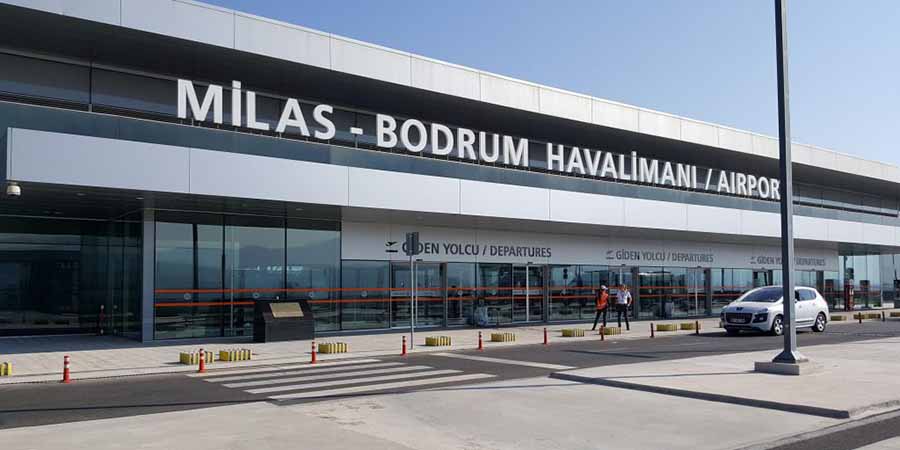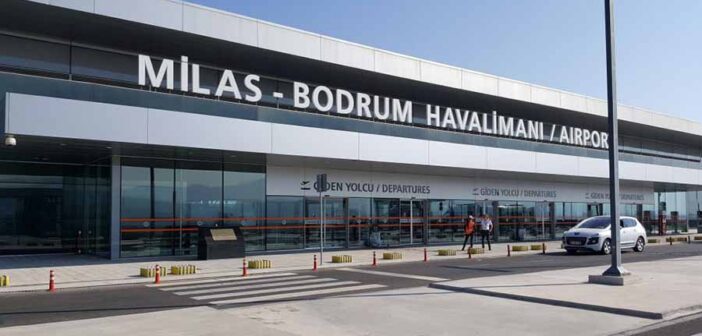
Milas-Bodrum Airport, located 36 kilometres northeast of Bodrum and 18 kilometres from Milas, serves as the primary gateway to Turkey’s Aegean coast, handling over 4 million passengers annually.
Operating since 1997, this civil airport, with the IATA code BJV, features separate international and domestic terminals, offering a functional experience for travellers exploring Bodrum’s resorts or connecting to European destinations.
The single-terminal layout, managed by TAV, is compact, with check-in desks and security on the ground floor and departure gates upstairs. Passengers often board via tarmac walks or shuttle buses, and clear signage in English and Turkish aids navigation, though the terminals can feel crowded during peak summer months.
Accessing the airport is straightforward with several transport options. The Havaş shuttle bus, timed with flight schedules, connects to Bodrum’s bus terminal in about 45 minutes for 110 TL, stopping at Güvercinlik and Torba. Muttaş shuttles offer a similar service at comparable prices.
Taxis, available 24/7 outside both terminals, cost around 800 TL to Bodrum city centre, taking 35 minutes, though fares vary with traffic. Car rentals from Avis, Hertz, and Sixt are located in the arrivals halls, and the D300 highway provides direct road access, with parking lots offering short- and long-term options, though some areas are temporarily closed due to ongoing solar power plant construction. Public buses to nearby towns like Milas are available, but no train or metro services operate near the airport.
Dining and retail options are practical but limited. The Cakes & Bakes café offers a cosy spot for coffee and pastries, while other eateries serve light meals and snacks at prices higher than local averages. A World Duty Free shop in the international terminal provides perfumes, alcohol, and souvenirs, complemented by a Relay store and smaller outlets for essentials.
Facilities include ATMs, currency exchange, and a visa office open 24/7 at the international arrivals floor. Free Wi-Fi is unavailable in passenger halls, but coffee shops and lounges offer connectivity. The Primeclass Lounge and CIP Lounge provide snacks and Wi-Fi for around €30, and accessibility features include ramps, adapted toilets, and assistance for passengers with reduced mobility, bookable through airlines. A prayer room and healthcare services are also available.
On-time performance is generally reliable, particularly for low-cost carriers like Ryanair and Pegasus, but peak season from June to August sees increased traffic, leading to potential delays.
Security queues can take 20-30 minutes, and international passengers face additional checks, including a third security point for UK-bound flights, which may add time. Weather disruptions, such as strong winds, and slot coordination issues at this busy airport can also affect schedules, so arriving two hours early for international flights is recommended.
Connections are efficient within each terminal, with domestic-to-domestic transfers taking as little as 20 minutes. International transfers may require 45-60 minutes due to passport control, and the 5-minute walk between terminals adds minimal time. Passengers with separate tickets may need to reclaim luggage and recheck, extending the process by up to an hour.Potential delays to watch for include congestion at check-in and security during peak hours, with reports of understaffing slowing passport control and baggage handling, sometimes by up to 45 minutes. The lack of free Wi-Fi and limited seating in waiting areas can add to discomfort during delays. Tarmac boarding and shuttle bus coordination may also slow operations in adverse weather.
Ryanair
Ryanair operates flights to Dublin from Bodrum, with schedules varying seasonally, from the International Terminal. Specific check-in desk numbers are not consistently published and may vary. Passengers should check the airport’s information screens for desk assignments. Bag drop desks are open 2 hours to 40 minutes before departure.
Flights to Ireland (Dublin) typically depart from international gates (gates 201–210). Gates are assigned dynamically and displayed on departure boards. Digital boarding passes are accepted, unlike in some Moroccan airports.




